|
When I critique my student's artwork I try to be straightforward and not mince my words. I also compliment them frequently in a positive way because I wish to affirm their suspicion that their creative efforts are worthwhile. By complimenting them I am not flattering or pandering, I am validating and supporting their discovery and excitement about making art. So compliments are very useful in that way.
However, even some accomplished artists, who no longer need validation, like to be complimented too, just for having talent, which is a different thing. Compliments make him feel good, even important. It feeds the ego. The true artist—the artist who is interested in deeper things, will appreciate and enjoy another artist's artwork, but is never impressed because another artist is talented. Neither is he impressed with his own talent, nor depressed by the lack of it. Because he is not interested in personal comparisons. He is only interested in the dynamic creative flow that he is involved in. And he enjoys seeing how that same amazing movement expresses through other artists. His attention is so fully absorbed in that, there is no room for petty comparisons or boasting. Now, the worst thing a person could say about your artwork is not that it is bad, ugly or amateurish. Surprisingly, comments like that are often very useful, especially if they are thoughtful and informed. And if the work inspires an engaging conversation then that would be an indirect compliment . However, one of the worst thing a person could say to an artists while looking at their art is “Gee, you are so talented! What does it feel like to be so talented? I have no talent whatsoever. I could never do what you do . . . “ In other words, whatever beauty or interest the viewer initially saw in the artwork is instantly obliterated by their ego talking about itself in comparison to another person, the artist. They have completely missed the gift the artist has offered them. On the other hand, one of the best compliments comes without words. It is to observe a viewer's quiet absorption and curiosity as they look at your artwork. In that moment you are watching them experience what you experience as the artist. You want them to experience that same timeless curiosity about the world, without any thought of themselves or another.
1 Comment
This essay was written in conjunction with the Consciousness Project painting series in which consciousness is expressed as light and space.
(I was asked how this essay on consciousness relates to Post Personalism art. It relates because Post Personalism includes the study of the evolution of human consciousness, which is one of the central themes explored in Post Personalism. Does Consciousness Originate In The Human Brain? The scientific view of consciousness is unable to accept the possibility that consciousness might originate not from inside the human brain but from outside the human brain. Because to acknowledge that possibility would be in their minds a slippery slope toward believing in a distant magical divine power. And that option does not sit well with scientists. But there is an entirely different way of looking at it. As scientists haven’t the foggiest idea what causes consciousness and yet they do not hesitate to offer their opinions about it anyway—I therefore feel at liberty to offer my own opinions too. I am not a scientist, and my opinions are born out of my own observations and my own philosophical inquiry. So let me start by saying that the idea that consciousness originates from inside the human brain through biological processes is flat out . . . probably incorrect. Why? because almost all human brain functions are activated, triggered, by things outside of the human brain. Read more. 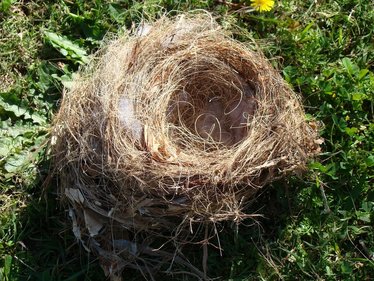 Does a bird create itself? There are two common answers to that question: Someone might say God created the bird. Another might say the evolutionary process created the bird. Either way, it is clear that the bird did not create itself. Therefore, however the bird was created, the bird was an effect of a cause. To be clear, my greater point has nothing to do with religion or science. It has only to do with bringing your attention to the obvious fact that a bird is not its own origin. It's origin preceded it. But, does a bird create its nest? Let's say you saw the bird creating the nest. So, yes, the bird created the nest. However, if the bird was the result of a creative cause, then by extention, what the bird creates must also be a continuing effect of that same creative cause. Therefore, in this analogy, our bird cannot claim so called personal credit for creating the nest. (Maybe a little, but only from the most narrow self-centric point of view). And now we come to the central point. Are nests all that different than works of art? No. Is it true that artists are also creative in a similar manner as nest-building birds are? Yes. Just as our analogous bird, the artist cannot claim personal credit for what he or she creates. (Maybe a little, but only from the most narrow me-centric point of view). Because the artist, like the bird, is merely an outer manifestation of an inner creative force. And so, from the 30,000 ft level as they say, there is no isolated, or special artist creating anything. There is only the universe expressing itself.. There is a third answer to the question of how the bird was created. And that is the creative intelligence of the universe created the bird and the nest. By saying “creative intelligence of the universe” I am not inferring a supreme being such as is promoted in the theory of intelligent design. Rather, I am pointing to the fact that the universe expresses itself intelligently. The benefit of describing creativity this way is that it employs evolution and natural selection as its process but also recognizes the presence of an intrinsic intelligence that pervades all life. Philosopher Alan Watts suggested that the individual human being is a particular focal point in which the universe expresses itself as the true Self. Idea for a cartoon: There are two paintings hanging in a museum and they are conversing while watching viewers pass by. One painting says to the other "Sure, you can call them human if you want, but what do they really mean?"
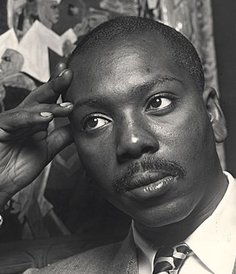 My belief is that it is most important for an artist to develop a philosophy about life. Then he does not put paint on canvas, he puts himself on canvas. Jacob Lawrence I love Lawrence's statement because it is suggest that the deeper artist asks deeper questions and is not merely applying an aesthetic affectation to the canvas. 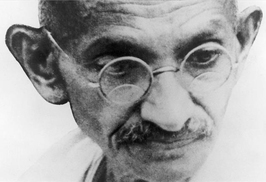 Mahatma Gandhi (1869-1948) Mahatma Gandhi (1869-1948) "Be the change you want to see in the world." —Mahatma Gandhi If that same inspiration could be applied to the art world then we could say "Be the change you want to see in the art world". If you have a passion to make beautiful, truthful and meaningful art in an art world that sometimes seems superficial and self-centric, then you are the one to bring the change that you want to see. -ph 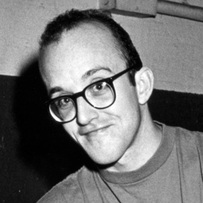 Keith Haring (1958-1990) Keith Haring (1958-1990) "When it is working, you completely go into another place, you're tapping into things that are totally universal, completely beyond your ego and your own self. That's what it's all about. " -Keith Haring (To be clear, Haring was not talking about Post Personalism specifically. He made that comment many years ago but it nevertheless aligns with the post personal project point of view today). |
AuthorPatrick Howe, Artist, Author, Educator, Electronic Music Composer Blog Categories
|

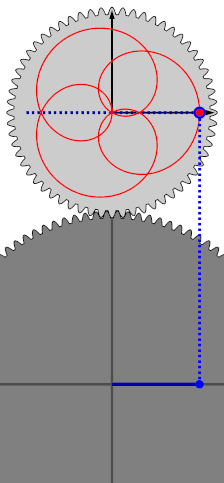
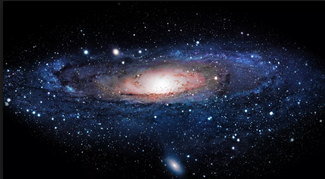
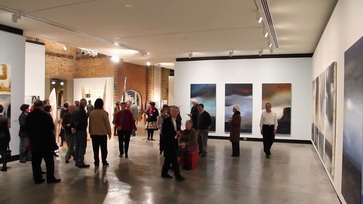

 RSS Feed
RSS Feed
